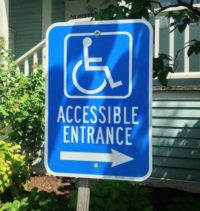Click here for the link to Part 1 of this Article dealing with the ADA or here for the link to Part 2 of this Article dealing with the Unruh Act and California’s Construction Related Accessibility Standards Act.
Commercial property owners are now required to notify lessees about their property’s compliance with accessibility standards. Civil Code Section 1938 now states: A commercial property owner or lessor shall state on every lease form or rental agreement executed on or after July 1, 2013 whether the property being leased or rented has undergone inspection by a Certified Access Specialist (CASp), and, if so, whether the property has or has not been determined to meet all applicable standards pursuant to Section 55.53.
The top 10 complaints received by California Commission on Disability Access are:
1 Parking. Loading zones/van access aisles are not compliant or non-existent.
2 Parking. Existing parking spaces are not compliant.
3 Accessible Route and Entry. Routes to and from parking lots are not accessible.
4 Parking. A parking lot does not contain minimum number of accessible parking spaces.
5 Parking. Signage in parking lot is not compliant. e.g., parking spaces need to be designated as reserved by a sign showing the symbol of accessibility.
6 Access within Public Facility. Heights of surfaces such as counters, bars, or tables are not compliant.
7 Access within Public Facility. Access aisles within the building are not accessible. e.g., dining or work surfaces are not on an accessible route.
8 Toilet rooms/Bathrooms. Grab bars in bathroom are non-existent, or grab bars are not compliant.
9 Toilet rooms/Bathrooms. Lavatories and mirrors in bathroom are not accessible.
10 Accessible Route and Entry. Entry doors are not accessible.
This information is provided for informational purposes only and should not be construed as legal advice. It should not be acted upon without consulting a licensed California attorney about the facts, particular needs and questions of the person or entity considering these issues.
